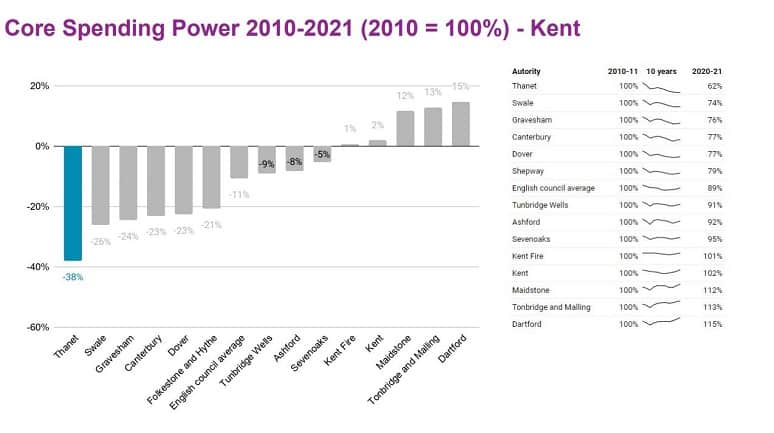
An ever-shrinking budget leaves Thanet council at ‘high risk’ of having to slash services, make large scale redundancies and having the authority managed by outside sources in the coming years, according to a report by finance officer Chris Blundell.
The corporate risk update, due to be discussed by councillors on the governance committee on March 4, says limited resources is “one of the few risks that in extremis could result in the council losing control of its own destiny”- meaning external auditors could take control if the authority were to run out of funds.
Decreased budgets
Thanet council has a £17.1 million budget to fund services during April 2020 – March 2021.
The pot is made up from council tax, fees and charges, retained business rates and Government funding.
This year there is a predicted £1.3million shortfall and that is expected to rise to £2.5million by 2023. The financial black hole comes amid plunging income from Government.
The Revenue Support Grant to Thanet from central government was £97,000 for the 2019-20 financial year. In 2018-19 it was £809,000 and in 2017-18 the grant stood at £1.446m. This is compared to £6.636m in 2013-14.
A one year government settlement of £100,000 has been made for 2020-21. Plans to end the government revenue support grant altogether have now been moved from 2020 to 2021.
Money from the government’s New Homes Bonus has dried up as TDC has not qualified for it since 2016-17, apart from small amounts for affordable housing growth.

Thanet’s core spending power has been slashed by almost 40% since 2010, the most of all Kent authorities.
In the risk report Mr Blundell says: “Due to national political uncertainty and an unresolved Brexit, the Chancellor confirmed that councils will now get a ‘one-year roll-over settlement’ for 2020-21.
“This has severe implications for financial planning in the Medium Term Financial Strategy and any longer term planning. Due to the government’s focus on Brexit, the Fair Funding Review, planned to be implemented in 2020-21 has also slipped to 2021-22.
“Therefore, the likelihood and severity of the impact of the risk becoming manifest (e.g. TDC having to terminate services, make large-scale redundancies and/or be externally governed or managed) remains high, not only now but for the immediate future.
“The council has recently approved the 2020-21 budget, however the abstention of a significant number of members on the vote in itself demonstrates the difficult financial decisions that are to be made to ensure the council remains financially sound.”
A review of the council’s financial management will be conducted during this year.
Intervention
Technically councils cannot go bankrupt and are required by law to have balanced budgets. If this cannot be done a section 114 order can be issued banning bans new expenditure. Auditors can issue advisory warning notices to making cuts or savings, there could be intervention by the Secretary of State and local government reorganisation.
This year Northamptonshire County Council will be dissolved and two new unitary authorities formed after government intervention when the authority declared insolvency in 2018. Only Parliament can dissolve a local authority.
Other risk areas
Three other high risk areas for Thanet are covered in the report to councillors.
These are political stewardship, East Kent Housing and Brexit.
Mr Blundell says the continued lack of overall control by one political party at Thanet council means “there remain ongoing issues which could have a significant effect on the council,” although he adds “the council continues to pursue opportunities to support cross-party working.”
The risk associated with East Kent Housing comes as Thanet, and the three other east Kent councils, have opted to bring housing back under authority control following a series of major failings at EKH,
Brexit risks follow the UK withdrawal from the European Union on January 31, although there is a transition period until December 2020.
The report says: “The scale of its effect should not be underestimated and the council has identified a lead officer to lead on Brexit related issues and progressed contingency planning for a disorderly Brexit. The significant issues to consider are those concerning the strategic transport network, funding and the port. In addition, the council has identified a number of issues that could potentially impact the council’s ability to deliver its services.”
Making savings
Thanet council is due to make £730,000 of savings this year with measures including the scrapping of the Waste & Recycling Education Officer post and the Open Spaces supervisor post and a predicted increase in green waste collections and income of £208,000 from fees and charges.
Proposals for more shared services, including leadership teams, have also been made.
Other proposals include gaining income from a new authority housing company which would manage housing for market rent and installing new beach huts, again with rental income.
To help fund services TDC is increasing its element of council tax by £4.95 – equating to a weekly rise of around 10p for an average Band D property.
Thanet District Council receives 13p in every £1 of council tax. The remainder goes to: Kent County Council, Kent Police, Kent Police and Crime Commissioner, Kent Fire and Rescue Service and Town/Parish Councils.
There will also be a council property rent rise of an average £2.50pw per property.

Thanet council leader Cllr Rick Everitt said: “The risks highlighted in the council’s Corporate Risk Management quarterly update report have been raised in the last two reports which were published in September and July 2019. They specifically refer to the challenges posed as a result of the cuts in Government funding and are sadly not new issues.
“We have been very clear that the financial position of this council, and indeed all local authorities, has been significantly impacted by those cuts. We have also been frank about the need to continually review the way we do things as a result, to make sure we are working as efficiently and effectively as possible.
“I am proud of the way that we have responded to those challenges, achieving a balanced budget and setting out plans for the year ahead which mean that we continue to deliver the services that we know matter the most to our residents.
“These remain difficult times for all public services and we will continue to be transparent about the challenges we face. For the time being there are no plans for corporate wide restructuring and we are confident that the balanced budget passed by council on 6th February, will allow us to maintain the key services we provide to the public”.

